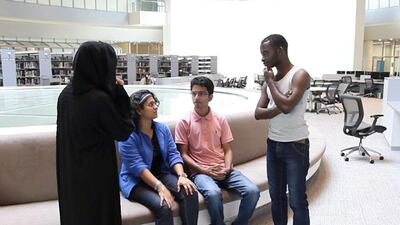ABU DHABI // Of all the students from around the world who have started at New York University Abu Dhabi this week, perhaps Rodger Iradukunda has had the toughest mission to get here.
For the 20-year-old Rwandan was just a baby when his family managed to escape the genocide in his home country by seeking asylum in Zambia.
The horror of 1994, when up to 1 million Tutsi and moderate Hutus were killed by members of the Hutu majority, is something that his father does not talk about.
Mr Iradukunda believes he is Hutu, but his father has told him not to worry about what he is.
“My parents tell us only bits and pieces, but when the war started my mum was at home with us and my dad at work,” he said. “They both had to leave and said to meet at the Congolese border, that’s when it started.”
From there, they fled to Zambia, where the family remained as refugees for years. After completing his schooling in Zambia, where he attended one of the country’s best prep schools and received top marks, he faced a struggle to find the funding to go to university.
He began preparing to apply to universities abroad to continue his studies but, unlike his friends with similar marks, he did not benefit from a government-sponsored scholarship.
“Zambians are very nice, my friends never made me feel like an outsider. Yes, my last name was odd, but they didn’t make a deal out of it,” Mr Iradukunda said.
Being a refugee meant that he could not get a scholarship from the Zambian government regardless of his grades, because the funding is reserved for nationals.
He applied for scholarships to universities in the US but received rejections and no financial assistance. He was left without an option to study abroad.
“I was so sad, for so long I couldn’t even watch American movies because it kept making me think I could have been that person,” he said.
Despite the setback, eventually he began to apply for university places again.
After being informed about NYUAD by a US embassy adviser, he took a chance and sent off an application.
The decision came shortly afterwards in an email inviting Mr Iradukunda to attend one of the universities’ candidate weekends, where they invite potential students for a weekend before making a final decision.
“When I received the email inviting me to come [to NYUAD], I was so excited. It was nice, but I knew I couldn’t afford it. But then I read to the bottom and it said in one line, ‘all expenses paid for’. It was a dream, I had never been treated like this,” Mr Iradukunda said.
However, his dreams were far from being realised. The first obstacle was that he did not have a passport. He requested that his candidate weekend invitation be postponed to give him some time to prepare travel documents.
He was aware that he would not be granted travel documents because the UN had invoked a “cessation clause” to Rwandan refugee status.
Mr Iradukunda had to plead to the local UN office to make an exception for him. But shortly after receiving the document he found out that the UAE does not recognise travel documents.
“It was like God didn’t want me to go, it was so disheartening. It’s one thing not to be able to go because of grades, but because of bureaucracy and governments.
“NYU told me they can’t do anything more and I became pessimistic,” Mr Iradukunda said.
His parents, however, decided to get in touch with the Rwandan government for the first time in almost two decades. They sent an application for his passport, asked that Mr Iradukunda’s uncle follow-it up and hoped for the best.
When news came that his passport was issued the day before the third and final candidate weekend for the year, Mr Iradukunda emailed NYU and a ticket was booked. He was on a flight four hours after receiving his passport.
“It was a dream. I had already missed two days, I didn’t sleep, I was there for less than 24 hours but it was amazing,” he said.
Shortly afterwards, he received the news of his acceptance into NYUAD on a scholarship and that he would start in autumn this year.
“Everything happens for a reason. Now I am here with so much diversity. Everyone here has a last name that is weird so it’s nice to feel like I’m a part of it,” he said.
“Growing up I felt like the odd one out. But now NYUAD, it’s so diverse that no one cares about your last name.” he said.
nalwasmi@thenational.ae

